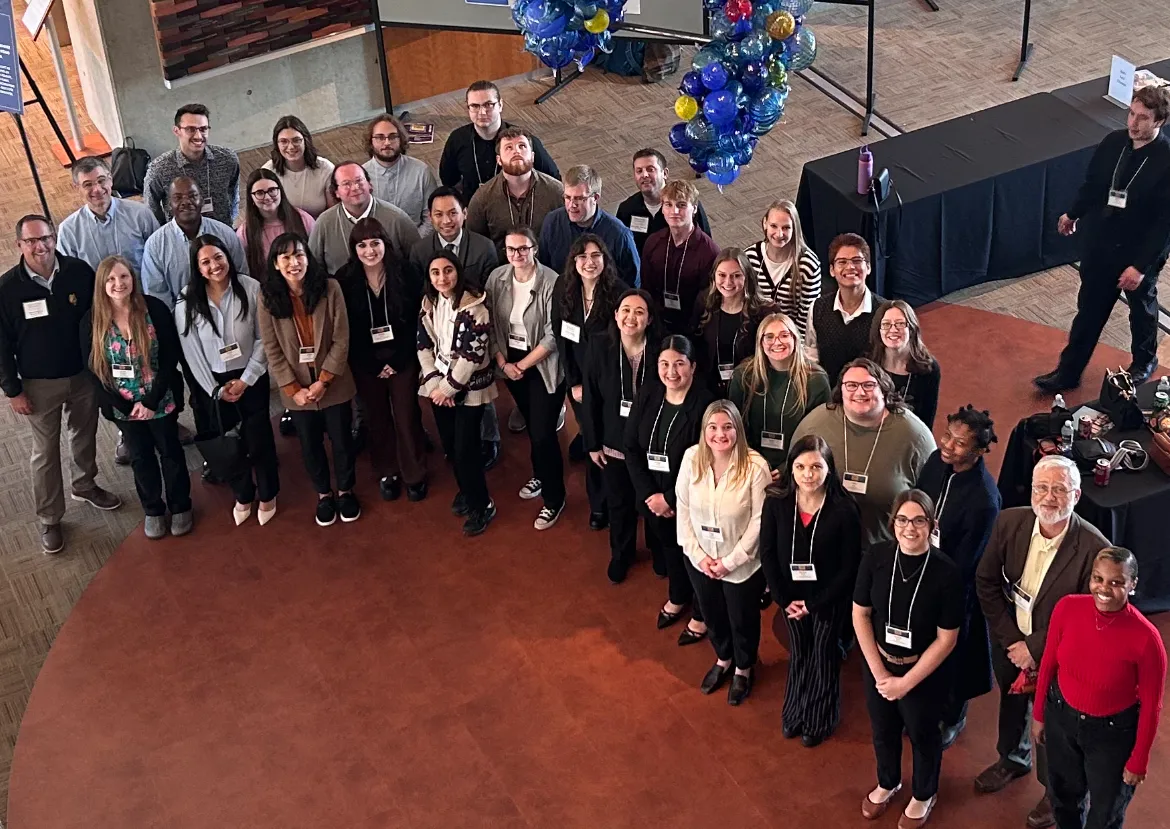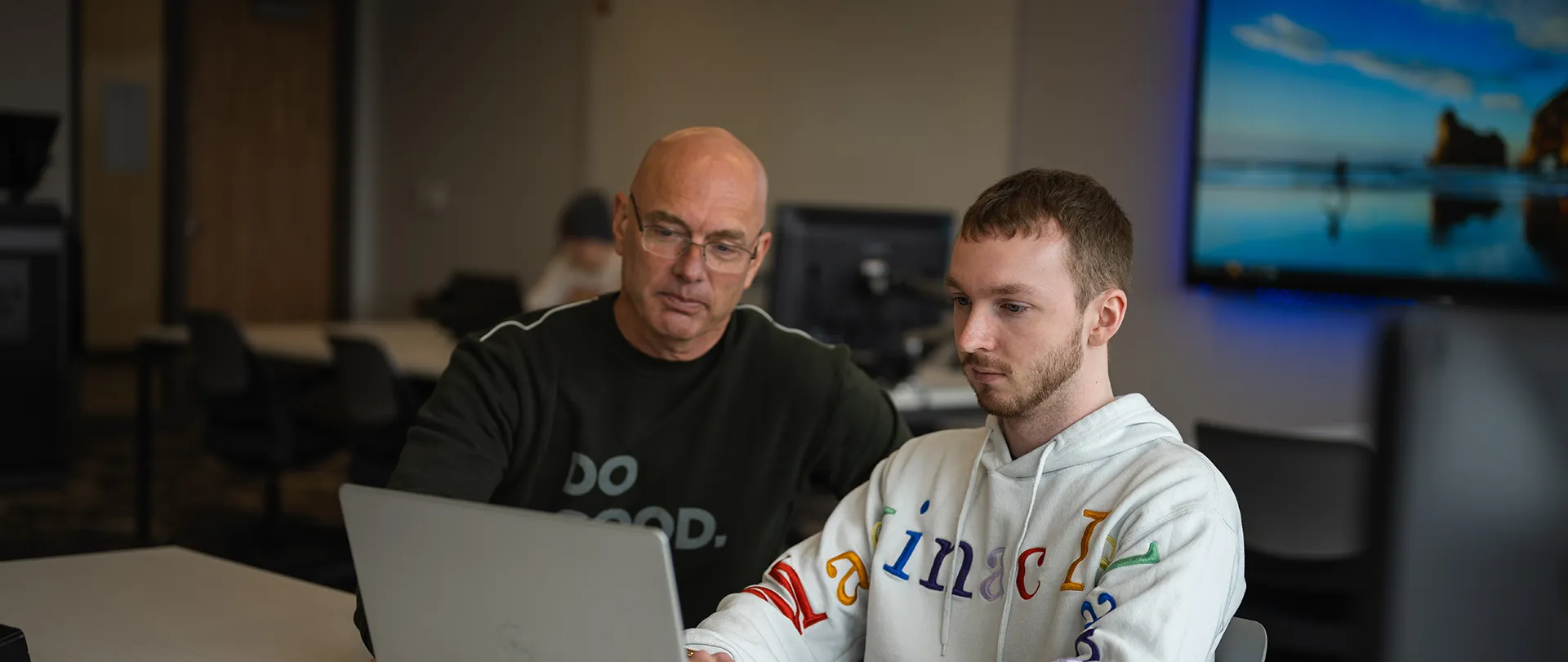Message from the Director
![]()
I am delighted to offer this FY24 Office of Research and Sponsored Programs Annual Report.
This year’s report is remarkable in many ways – including record-breaking external funding to support innovative projects designed by our students and faculty. Innovation continues to be a focus of the University’s Strategic Plan (2024 – 2027) moving “Ferris Forward” as envisioned by our founders, Woodbridge and Helen Ferris.
FY24 Highlights
- Hosted a 4-week intensive Grant Writing Program for 22 faculty and staff.
- Expanded research collaborations with the FSU Honors Program.
- Celebrated our 11th year of the Summer Student Fellows Program impacting over 140 students.
- Hosted the University-wide Annual Celebration of Student Research and Creative Activities,
where nearly 50 student authors presented their projects representing 14 Colleges
and units.

Ferris State students and faculty attending the Van Andel Undergraduate Research Conference
- Intellectual Property developed by Dr. Sonali Kurup, Associate Professor of Pharmacy, resulted in U.S. Patent No: 11,814,388 B1, "Substituted pyrrolo[2,3-d]pyrimidines and pyrazolo[3,4-d]pyrimidines as inhibitors for multi-resistant cancers”.
- Record-breaking grant funding ($14M) in the final year of the 2021-2024 Strategic Plan. During this 4-year period, Ferris was awarded nearly $35 Million in new grants, averaging $4.4 Million per year, representing a 3-fold increase in funding.
- Our Institutional Review Board (IRB) continues to play a critical role in educating the campus community on research involving human subjects. These projects range from educational scholarship to medication usage and health outcomes research being carried out by our students and faculty. Under the leadership of the IRB Chair (Dr. David White) and Research Compliance Officer (Maureen Wawsczyk), 126 new research projects involving nursing, pharmacy, education, and learning innovations are managed and approved by the IRB. These projects are often required as part of advanced, graduate-level, doctoral and master’s degree programs.
- Delivered IRB education offerings during FY24 including:
- IRB & IBC Committee overview
- FERBA & IRB Research
- Conflicts of Interest in Research
- Overview of Research Agreements
On behalf of the grants and research team at Ferris, I look forward to working with you to move Ferris Forward!
THOMAS Dowling, Ph.d.
Director, Office of Research and Sponsored Programs
Key Impacts
109
New IRB Applications
34
Funded Projects
$14,367,345
FY24 Funding
Impact Stories
Ferris State Receives 4-year, $1.2 Million Rural Health Network Development Grant funded by HRSA
![]()
Led by Dr. Gail Bullard, Professor in the College of Health Professions, the “Rural Substance Use Disorder Network: Ferris State University (CMREN-FSU)” grant addresses a major public health crisis occurring in rural Michigan. Funded through the Federal Office of Rural Health Policy, Rural Health Network Development through 2027, the grant continues the FSU regional Substance Use Disorder (SUD) work that began in 2016. Now partnering with thirty-four agencies across the five-county region of Mecosta, Osceola, Lake, Newaygo, and Montcalm counties, this collaborative approach to systems change allows the development of a sustainable recovery ecosystem by addressing stigma and those Social Determinants of Health needs necessary for sustainable recovery. Realizing SUD knows no boundary, impacting individuals of any age, race, ethnicity, and socio-economic status, CMREN’s SUD focus populations are pregnant, homeless/unhoused, recently incarcerated, and/or veterans. The CMREN-FSU project creates a sober recovery ecosystem in HRSA-designated rural counties that are known to have shortages in primary care, mental health, and dental care. Jointly the network identifies gaps and amplifies services to develop seamless integrated care for those seeking sustainable SUD recovery. Goals of the recovery ecosystem are to decrease the incidence of overdose-related morbidity and mortality, increase the incidence of long-term recovery and decrease the incidence of overdose and substance use disorder (SUD). Further benefits of this grant project include improved integrated care for persons with SUD, with a special focus on veterans, pregnant women, those released from incarceration, and homeless adolescents and adults.
Ferris State awarded over $500,000 in EV workforce development grants from the National Science Foundation
![]()
According to Dr. Patrick English, Project Director and Professor in the College of Engineering Technology, and his grant team, “the fast pace of Electric Vehicle (EV) transition throughout the nation has prompted the need for thousands of EV technicians for every category of transportation. Yet, many colleges and Universities do not have the capability to offer EV technology in automotive programs, creating a significant skills gap.” To address these workforce issues, Dr. English received 2 multi-year grants funded by the National Science Foundation. The first grant, entitled “The Sustainable Transportation Service Technician Education Project (STSTEP)” focuses on technical education in advanced EV technology including vehicle high voltage. Here, certificate and 2-year degree programs are designed to produce job-ready workers at the technician level to support an increase in new technicians entering the EV service sector. Further, these graduates are well-prepared to continue their education in four-year degree programs. The grant also includes professional development programs for faculty who will be empowered to bring the technology back to further enhance existing programs to further benefit underrepresented and underserved populations. Dr. English also serves as project lead on a 3-year NSF-funded Northwest Electric Vehicle Technology Exchange (NEVTEX) Next subcontract that addresses EV workforce development across the country. He is working with a consortium of 15 two-year colleges to develop and implement nationally recognized EV training programs. Here, best practices are shared and implemented across these partner two-year colleges to increase enrollment of underrepresented students in EV programs. This work will ensure students, technicians, educators and college EV programs follow standards-based training and the EV workforce is properly trained to meet industry demands.
NSF grants fuel undergraduate research in drug discovery
![]()
Dr. Eric Nybo, Associate Professor of Pharmacy, received 2 grants from the National Science Foundation totaling over $700,000. These 3-year awards are part of the NSF Research in Undergraduate Institutions (RUI) program to support research by faculty members at predominantly undergraduate institutions (PUI). RUI proposals support PUI faculty in research that engages them in their professional field(s), builds capacity for research at their home institution, and supports the integration of research and undergraduate education. For the grant “BIOPOLYMER - BIObricks POLYketide Metabolic EngineeRing platform for unraveling the biosynthesis of higher anthracyclines”, Dr. Nybo and his research team will use soil bacteria to help create new drugs in the class of anthracyclines (ACs), used to treat several types of cancer and infectious diseases. By further understanding the regulation of AC production, related enzymes and pathways will be "mixed and matched" to produce novel ACs with potentially novel anti-tumor properties. The project will incorporate undergraduates in research training to prepare them for careers in the biomanufacturing economy. The second grant, entitled “RUI: Chemoenzymatic fluorination of aromatic compounds “, funded through NSF's Mathematical and Physical Sciences (MPS) program, supports research on developing new chemoenzymatic strategies for incorporating carbon-fluorine bonds into aromatic polyketides. The project will involve undergraduate students in studying the biosynthesis of organofluorine molecules, including training in NMR spectroscopy and the creation of social media explainer videos on NMR techniques. The research aims to provide new insights into enzymatic processes for generating fluorinated aromatic compounds, which have important applications in pharmaceuticals and agricultural chemicals. Dr. Nybo is also the recipient of the 2024 Academic Scholar award for meritorious research.
Ferris receives over $450,000 in State grants to address workforce shortage in behavioral health
![]()
Ferris State’s Master of Social Work (MSW) program has a strong track record of preparing students for clinical social work practice to positively impact the lives of individuals, families, and the community. In 2024, the MSW program received 2 grants from the Michigan Department of Education’s Office of Health and Nutrition Services and the Michigan Department of Health and Human Services (MDHHS) to further support students in their experiential education and pursuit of careers in the public health sector. Under the direction of Drs. Michael Berghoef, Carolyn Sutherby, Janet Vizina-Roubal and Rita Walters, a grant from the MDE Section 31FF SMART program will support internships in public schools that serve economically disadvantaged students. The second grant, funded by the MDHHS Bachelor of Social Work (BSW) to Master of Social Work (MSW) 1914 Program, seeks to increase the number of master's degree level social workers in the behavioral health workforce throughout the state. Ferris was one of 12 Michigan Universities selected to receive the award, which provides one-time, $30,000 stipends to bachelor’s level social workers who agree to enter a full-time advanced standing MSW program and provide at least two years of full-time employment in public sector behavioral health in Michigan.


